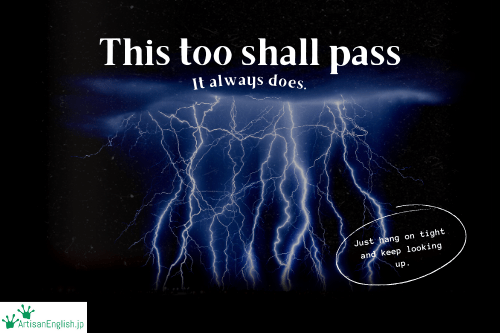
YouTube / iTunes / Spotify / Radio Public / Pocket Casts / Google Podcasts / Breaker / Overcast
Listen to ArtisanEnglish.jp posts & lesson intros here.
Adage: This too shall pass
Estimated reading time: 3 minutes
Today’s phrase this too shall pass is of Persian origin.
It is said that a sultan asked his wise men to create a ring that would make him happy.
They wrote this phrase on a ring and gave it to him.
It worked.
When he experienced difficulty, he could gaze upon the ring and know his challenges would not last forever.
In good times, however, it had the opposite effect.
This too shall pass reminded him of how fleeting good times can be.
That’s how it goes with wisdom; it is both a blessing and a curse.
So you see, the adage this too shall pass is both for the pessimists and optimists in life.
It is also a simple yet profound statement of fact.
Change is the only constant in life.
That’s where the Romans and their carpe diem come in.
When times are good, seize the day and enjoy every moment because they will not last forever.
The farmers simplified it with their make hay while the sun shines.
Like or follow ArtisanEnglish.jp on social media.
Whether you say it in Persian, Latin or English, engrave it on a ring, yell it out loud or write it on a plaque above your fireplace, they all mean the same: things change.
At this point, we can all take solace in the adage and look forward to a time when the pandemic is nothing but a memory.
The future looks promising, but one day when things are going well, you will have to remember this too shall pass and prepare for when things are not going so well.
The eternal truth of this too shall pass has the power to make a happy person sad and a sad person happy.
Flesch-Kincaid Readability Test
This post is understandable by someone with at least a 6th-grade education (age 11).
On the Flesch-Kincaid reading-ease test, this post scores 81.
The easier a passage is to read, the higher the score on a scale of 0 – 100.

